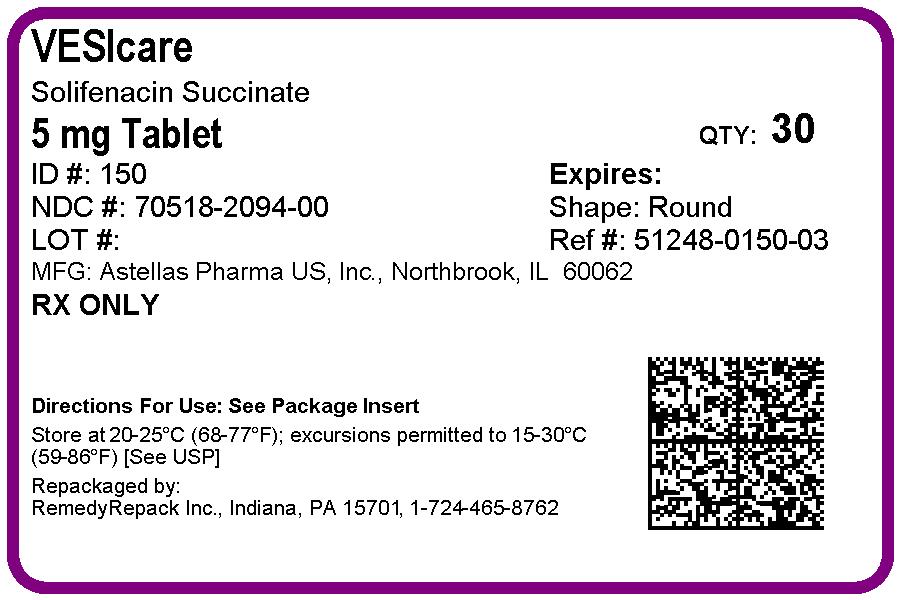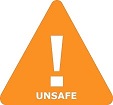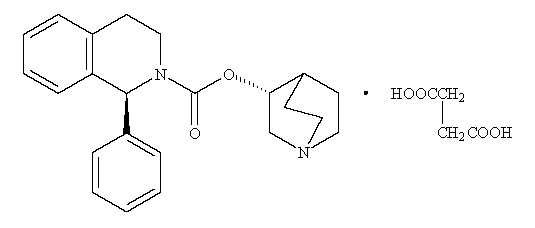Vesicare | Solifenacin Succinate Tablet while Breastfeeding

What is Vesicare | Solifenacin Succinate Tablet used for?
What are the risk associated with Vesicare | Solifenacin Succinate Tablet usage while breastfeeding? What precautions shall I take while using it in breastfeeding?

8.3 Nursing Mothers After oral administration of 14C-solifenacin succinate to lactating mice, radioactivity was detected in maternal milk. There were no adverse observations in mice treated with 1.2 times (30 mg/kg/day) the expected exposure at the maximum recommended human dose [MRHD]. Pups of female mice treated with 3.6 times (100 mg/kg/day) the exposure at the MRHD or greater revealed reduced body weights, postpartum pup mortality or delays in the onset of reflex and physical development during the lactation period. It is not known whether solifenacin is excreted in human milk. Because many drugs are excreted in human milk, VESIcare should not be administered during nursing. A decision should be made whether to discontinue nursing or to discontinue VESIcare in nursing mothers.
Vesicare | Solifenacin Succinate Tablet Breastfeeding Analsys
Solifenacin succinate while Breastfeeding
UnsafeAdvice to take a minimal dose for a short time since anti-cholinergic drugs may decrease breast milk production. Check-up for anti-cholinergic symptoms (mouth dryness, constipation...)
Vesicare | Solifenacin Succinate Tablet Breastfeeding Analsys - 2
Solifenacin succinate while Breastfeeding
CAS Number: 242478-37-1
Because there is no published experience with solifenacin during breastfeeding and it has a long half-life averaging 55 hours, an alternate drug may be preferred, especially while nursing a newborn or preterm infant. Long-term use of solifenacin might reduce milk production or milk letdown. During long-term use, observe the infant for signs of decreased milk production (e.g., insatiety, poor weight gain) and for anticholinergic symptoms (e.g., constipation, urinary retention, UTI, dry mouth).

What if I already have used Vesicare | Solifenacin Succinate Tablet?
We have already established that Vesicare | Solifenacin Succinate Tablet is unsafe in breastfeeding and breastfeeding while using Vesicare | Solifenacin Succinate Tablet is not a good idea however if have already used
I am nursing mother and my doctor has suggested me to use Vesicare | Solifenacin Succinate Tablet, is it safe?
If your doctor knows that you are breastfeeding mother and still prescribes Vesicare | Solifenacin Succinate Tablet then there must be good reason for that as Vesicare | Solifenacin Succinate Tablet is considered unsafe, It usually happens when doctor finds that overall advantage of taking
If I am using Vesicare | Solifenacin Succinate Tablet, will my baby need extra monitoring?
Yes, Extra monitoring is required if mother is using Vesicare | Solifenacin Succinate Tablet and breastfeeding as it is considered unsafe for baby.
Who can I talk to if I have questions about usage of Vesicare | Solifenacin Succinate Tablet in breastfeeding?
US
National Womens Health and Breastfeeding Helpline: 800-994-9662 (TDD 888-220-5446) 9 a.m. and 6 p.m. ET, Monday through Friday
UK
National Breastfeeding Helpline: 0300-100-0212 9.30am to 9.30pm, daily
Association of Breastfeeding Mothers: 0300-330-5453
La Leche League: 0345-120-2918
The Breastfeeding Network supporter line in Bengali and Sylheti: 0300-456-2421
National Childbirth Trust (NCT): 0300-330-0700
Australia
National Breastfeeding Helpline: 1800-686-268 24 hours a day, 7 days a week
Canada
Telehealth Ontario for breastfeeding: 1-866-797-0000 24 hours a day, 7 days a week
